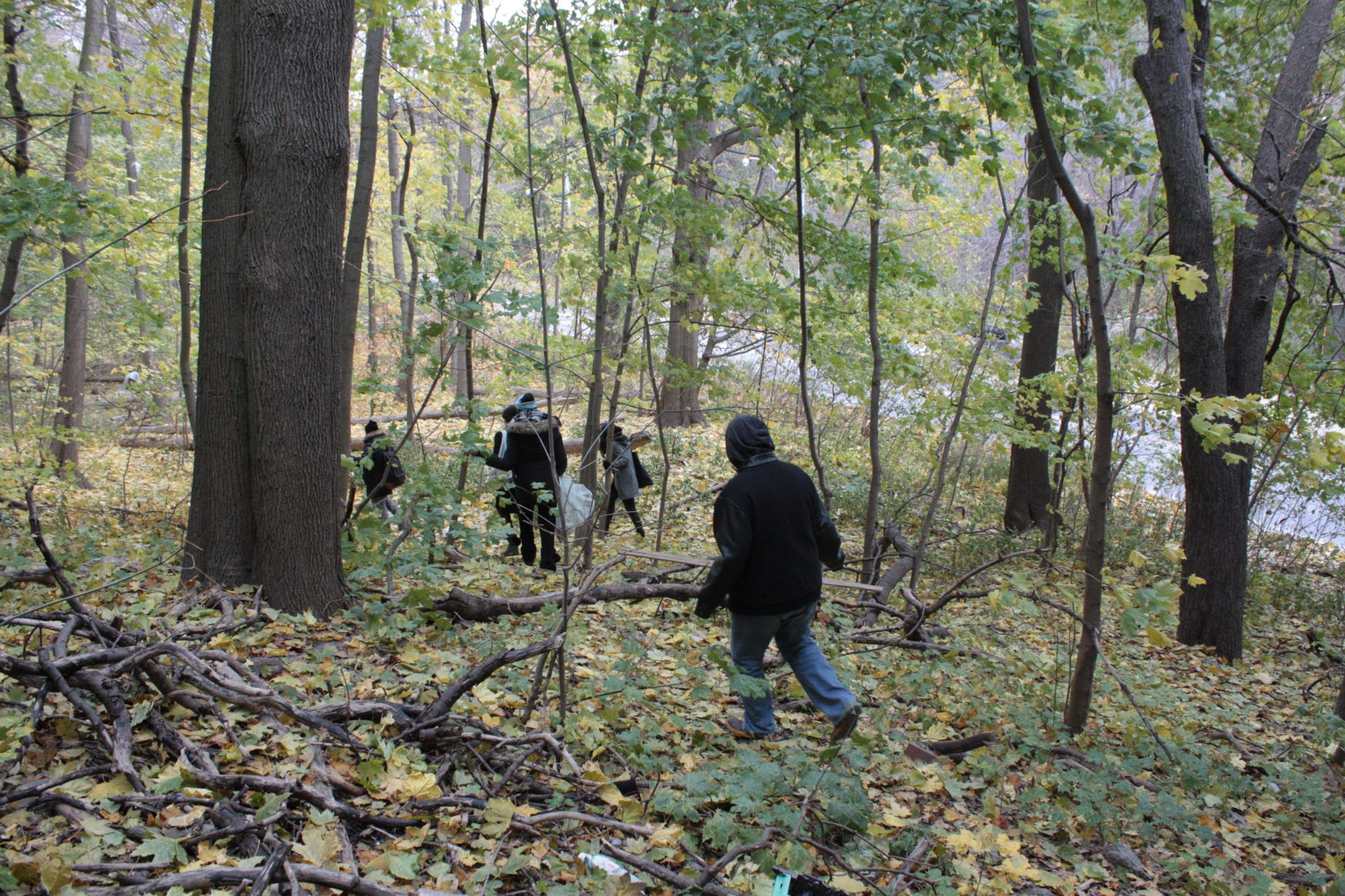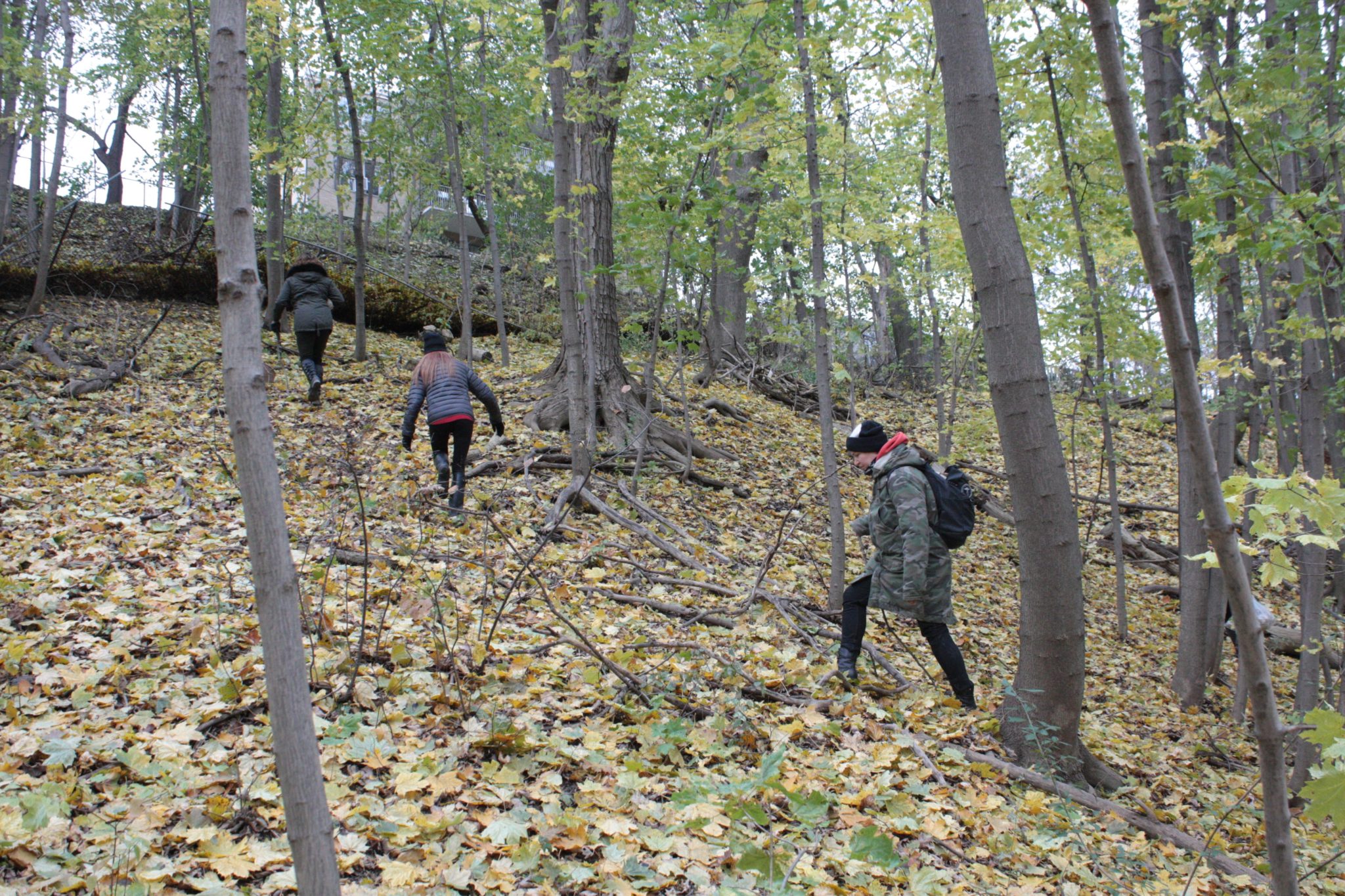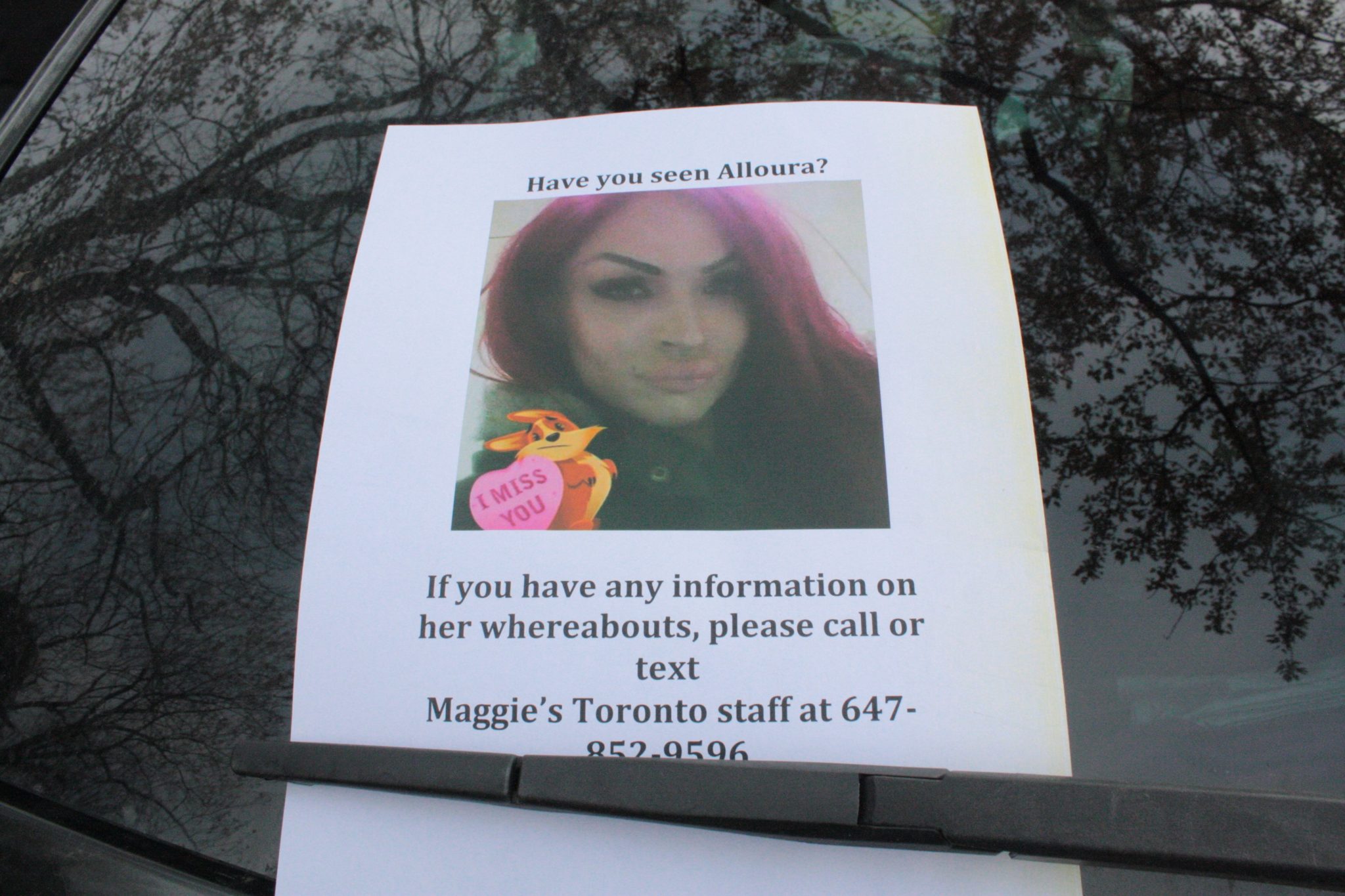In the bitter cold on an overcast Saturday afternoon, about 25 friends of Alloura Wells gather in a park next to a deep ravine in Toronto’s east end, preparing to search for any trace of the missing woman who lived there.Toronto Police are absent, saying they were unable to attend. However police told VICE News they searched Rosedale Ravine on Thursday and Friday, and liaised with those who attended Saturday’s search in case they found anything.“You guys, we’ve never done a search before,” Ellie Ade Kur, a board member with outreach group Maggie’s Toronto Sex Workers Action Project, calls out, raising her voice to reach those in the back. “This is something the police are supposed to do, so we’re just going to try it.”Alloura Wells, also known as Alloura Hennessey, loved to wear makeup and would most often wear long wigs — one fire engine red and one with dark roots that faded to blonde at the ends. She was quiet until you got to know her better, friends say. The urgency of the search is heightened by news last week that a local resident found a body in the ravine on Aug. 5 and reported it to police. Last Thursday, Alloura’s father gave a DNA sample to police to find out whether it was her, Forrester says. Police confirmed a body was found in August in the Rosedale Valley area and that they are now awaiting DNA results to determine the person’s identity.It is unknown whether the body is Alloura’s.Alloura is not the first trans person to go missing, and advocates fear she won’t be the last.In September, 26-year-old Sisi Thibert, a transgender sex worker, was stabbed to death in Montreal. In 2015, transgender Muslim woman Sumaya Dalmar, also 26, was murdered in Toronto’s east end. In 2013, transgender woman Rosa Ribut, 35, was beaten to death in Edmonton.Canadian authorities do not track hate crimes specifically targeting transgender people, however the Trans Pulse Project found that 20 percent of trans people in Ontario report being sexually or physically assaulted. In the U.S., advocacy group Human Rights Campaign said 23 transgender people were killed by violent means in 2016 — the highest figure on record. But 2017 has already surpassed that number with 25 violent deaths of trans people in the U.S.Globally, more than 2,300 trans and gender non-conforming people were murdered between between 2008 and 2017, according to The Trans Murder Monitoring Project advocacy group.Forrester says there are other trans women missing in Toronto, and she knows two young transgender women who recently died from opioid overdoses.The high number of missing trans people is the reason behind the annual worldwide Transgender Day of Remembrance on Nov. 20. Alloura’s case will be highlighted at this year’s vigil in Toronto.“I just want to find Alloura, to hopefully find her alive, and if not, to get some closure,” Forrester says.Forrester last saw her in July. Alloura last posted publicly on Facebook on July 26.
The urgency of the search is heightened by news last week that a local resident found a body in the ravine on Aug. 5 and reported it to police. Last Thursday, Alloura’s father gave a DNA sample to police to find out whether it was her, Forrester says. Police confirmed a body was found in August in the Rosedale Valley area and that they are now awaiting DNA results to determine the person’s identity.It is unknown whether the body is Alloura’s.Alloura is not the first trans person to go missing, and advocates fear she won’t be the last.In September, 26-year-old Sisi Thibert, a transgender sex worker, was stabbed to death in Montreal. In 2015, transgender Muslim woman Sumaya Dalmar, also 26, was murdered in Toronto’s east end. In 2013, transgender woman Rosa Ribut, 35, was beaten to death in Edmonton.Canadian authorities do not track hate crimes specifically targeting transgender people, however the Trans Pulse Project found that 20 percent of trans people in Ontario report being sexually or physically assaulted. In the U.S., advocacy group Human Rights Campaign said 23 transgender people were killed by violent means in 2016 — the highest figure on record. But 2017 has already surpassed that number with 25 violent deaths of trans people in the U.S.Globally, more than 2,300 trans and gender non-conforming people were murdered between between 2008 and 2017, according to The Trans Murder Monitoring Project advocacy group.Forrester says there are other trans women missing in Toronto, and she knows two young transgender women who recently died from opioid overdoses.The high number of missing trans people is the reason behind the annual worldwide Transgender Day of Remembrance on Nov. 20. Alloura’s case will be highlighted at this year’s vigil in Toronto.“I just want to find Alloura, to hopefully find her alive, and if not, to get some closure,” Forrester says.Forrester last saw her in July. Alloura last posted publicly on Facebook on July 26. The steep slopes of the Rosedale Ravine are carpeted with yellow-green leaves. Trucks thunder by, echoing off the ravine walls and making it hard to hear the person next to you.The search party is untrained; they follow each other aimlessly through the woods. The searchers grab large sticks and use them to poke at suitcases, high heeled shoes and other cast away objects.Alloura lived here. This is where people without homes come to sleep, have sex with clients, party, or just escape society’s judgement, according to her friends who have also lived here. Bridges criss-cross the ravine, providing scant shelter from the rain and snow. Under one bridge, an old arm chair and mattress create a living space.When they speak about Alloura, her friends waver back and forth between past and present tense, unsure whether she is dead or alive.When Alloura would walk into a room, all eyes were on her, remembers her friend Mandii, who identifies as two spirit and wears a long blonde wig. She offers me some white pine needles. Alloura loved to burn these like incense, she says.Once Alloura’s case is solved, she wonders if police will change how they treat cases of missing trans women.Tina Maria Collins, a trans woman who knew Alloura for six years, says “she was never afraid to put her makeup on.” She would go to the 519, a local drop in, to eat meals on Sundays.Tina used to sleep in the ravine, except two or three nights a week when she would meet clients and sleep at their houses.She didn’t feel safe down here because people would come down to party and drink. But she felt she could call police if she was in danger and they would come. Or if sex workers had a bad date, they could flag down a car on the highway.As she walks along the side of the highway that cuts down the middle of the ravine, Saharla Farah, another of the missing woman’s friends, says, “It’s sad police aren’t here because really this is their job.”At the end of the afternoon, the searchers find no clues that could shed light on the missing woman’s case. Forrester says even though they didn’t find anything, the search created a sense of unity among the woman’s worried friends.
The steep slopes of the Rosedale Ravine are carpeted with yellow-green leaves. Trucks thunder by, echoing off the ravine walls and making it hard to hear the person next to you.The search party is untrained; they follow each other aimlessly through the woods. The searchers grab large sticks and use them to poke at suitcases, high heeled shoes and other cast away objects.Alloura lived here. This is where people without homes come to sleep, have sex with clients, party, or just escape society’s judgement, according to her friends who have also lived here. Bridges criss-cross the ravine, providing scant shelter from the rain and snow. Under one bridge, an old arm chair and mattress create a living space.When they speak about Alloura, her friends waver back and forth between past and present tense, unsure whether she is dead or alive.When Alloura would walk into a room, all eyes were on her, remembers her friend Mandii, who identifies as two spirit and wears a long blonde wig. She offers me some white pine needles. Alloura loved to burn these like incense, she says.Once Alloura’s case is solved, she wonders if police will change how they treat cases of missing trans women.Tina Maria Collins, a trans woman who knew Alloura for six years, says “she was never afraid to put her makeup on.” She would go to the 519, a local drop in, to eat meals on Sundays.Tina used to sleep in the ravine, except two or three nights a week when she would meet clients and sleep at their houses.She didn’t feel safe down here because people would come down to party and drink. But she felt she could call police if she was in danger and they would come. Or if sex workers had a bad date, they could flag down a car on the highway.As she walks along the side of the highway that cuts down the middle of the ravine, Saharla Farah, another of the missing woman’s friends, says, “It’s sad police aren’t here because really this is their job.”At the end of the afternoon, the searchers find no clues that could shed light on the missing woman’s case. Forrester says even though they didn’t find anything, the search created a sense of unity among the woman’s worried friends.
Advertisement
The 27-year-old woman has been missing since July, and her friends say police have been slow to act on her case because she is a transgender sex worker who was living under a bridge in the Rosedale Ravine.Her father tried to report her missing on Nov. 5, but police turned him away when they learned she was homeless, according to Monica Forrester, who also works with Maggie’s. Forrester has known Alloura for eight years and is acting as a family liaison in this case.Toronto Police have since apologized publicly and put out a missing person news release.“The response that was apparently given, that is not what is expected of officers at 51 Division or anywhere else on the service,” police spokesperson Mark Pugash told Metro News.Police say they are taking the case seriously. “When the report was filed, we began actively investigating her disappearance, including the search of various locations that she was known to frequent,” a Toronto Police spokesperson told VICE News.“She was never afraid to put her makeup on”
Advertisement

Advertisement

“I just want to find Alloura, to hopefully find her alive, and if not, to get some closure”
Advertisement
